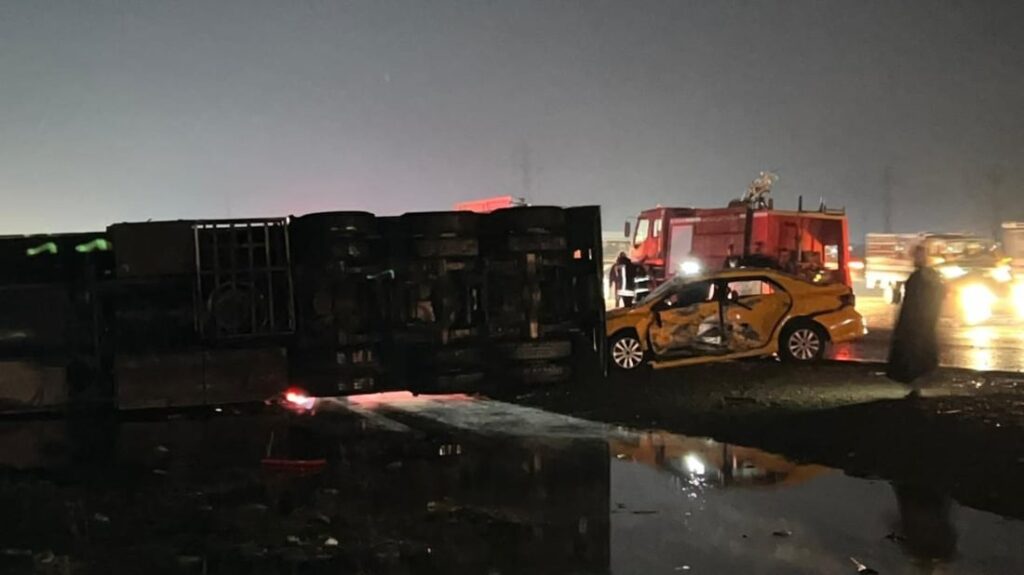Syrian opposition leader says state institutions will be preserved in 18-month transition

A governing body run by the Syrian opposition will lead a transitional period of 18 months, including six months to draft a new constitution, the head of the main Syrian opposition coalition told Middle East Eye on Sunday.
Hadi al-Bahra spoke with MEE on the sidelines of the Doha Forum conference hours after Syrian rebels toppled Bashar al-Assad, ending his family's 54-year authoritarian rule after nearly 14 years of war.
Al-Bahra is the president of the Syrian National Coalition, an alliance of opposition groups formed in exile following the 2011 uprising against Assad.
He said his opposition coalition should be expanded to add “new elements of the opposition”, and would then be tasked with forming a transitional government acting as president of the country until a new constitution is ratified.
Al-Bahra said the transition should be in line with United Nations Security Council Resolution 2254, adopted on 18 December 2015, which outlines a roadmap for Syria's political transition, including nationwide ceasefire, accountability for atrocities, and free and fair elections under a new constitution.
Rebel fighters entered Damascus around 5am local time without resistance, quickly capturing the international airport, the state TV building and many other strategic government facilities.
Government forces and personnel reportedly withdrew from their positions, allowing a smooth takeover for the rebels.
Assad himself reportedly boarded a plane before rebels reached the capital and fled to an unknown location. His current whereabouts are unclear.
His prime minister, Mohammad Ghazi al-Jalali, has agreed with rebels to remain in Syria and support the transition to a new system.
Read More »"We appreciate that the prime minister did not run away like the president," Al-Bahra said.
"He took a risk and he stayed. But then he was comforted knowing that nobody will hurt him. And then he volunteered also to have a transitional plan transition and organise transition."
Al-Bahra spoke about the need to preserve Syrian institutions and protect the economy over the next phase.
“We don't want to destroy the current state institutions. We want to keep them running,” he said.
He explained that current civil servants will remain in their jobs, and that only political appointees will be replaced. The priority will be to enhance government services by training and “injecting new blood” into agencies, including through “high-tech capabilities”.
“We need to rerun the economy,” he said, but noted that this would require the support of other countries.
“Syria needs humanitarian assistance,” he said, noting that this year aid to Syria has dropped by 26 percent.
“We need to start early recovery projects to make life easier for the people and also to start increasing the livelihood of the people and provide job opportunities for them,” he said.
“If we can get the economy to rerun itself within a year and a half to two years, then we will become less dependent on humanitarian assistance.”
'World record'
Al-Bahra said the rebels set a "world record" by liberating the capital Damascus within less than two weeks after rebel groups led by Abu Mohammed al-Jolani's Hay'at Tahrir al-Sham (HTS), began their offensive from northern Idlib province.
“We did that while the international community was about to normalise their relations with Assad,” he said.
"They believed that he won, but they never understood that the Syrian crisis has its own dynamic."
Al-Bahra said that his vision for the new Syria is a “united land and people, where all citizens have equal rights and duties”.
Read More »Speaking of the role of the Kurdish-dominated Syrian Democratic Forces (SDF), who control swathes of eastern Syria, al-Bahra said it needs to break its relationship with the Kurdistan Workers’ Party (PKK), a Kurdish armed group designated as a terrorist organisation by Turkey, the US and the EU.
He said the SDF “did not stand clearly with the Syria revolution”, and sided with the Assad government on many occasions.
He said the opposition expect the SDF to cut its relations with the PKK in order to be included in the transitional period.
“They should become a 100-percent Syrian organisation sharing the same objectives,” he said.
Al-Bahra said that Syrian exiles can now return to their homes, if they haven't been destroyed by fighting. More than half the population has been either internally displaced or forced to live as refugees in other countries since Assad's violent supression of the 2011 uprising.
"Now they have the option to go back home," he said.
"My house in Damascus has been confiscated by the government and Hezbollah. A senior leader of Hezbollah has been living in my house. Now I can liberate my house, at least get it back. And I could visit Syria more often, and I can have the option to stay in Syria."




